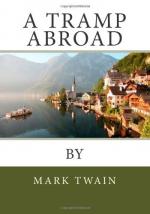We took a tolerably early breakfast, and tramped off toward Zermatt through the reeking lanes of the village, glad to get away from that bell. By and by we had a fine spectacle on our right. It was the wall-like butt end of a huge glacier, which looked down on us from an Alpine height which was well up in the blue sky. It was an astonishing amount of ice to be compacted together in one mass. We ciphered upon it and decided that it was not less than several hundred feet from the base of the wall of solid ice to the top of it—Harris believed it was really twice that. We judged that if St. Paul’s, St. Peter’s, the Great Pyramid, the Strasburg Cathedral and the Capitol in Washington were clustered against that wall, a man sitting on its upper edge could not hang his hat on the top of any one of them without reaching down three or four hundred feet—a thing which, of course, no man could do.
To me, that mighty glacier was very beautiful. I did not imagine that anybody could find fault with it; but I was mistaken. Harris had been snarling for several days. He was a rabid Protestant, and he was always saying:
“In the Protestant cantons you never see such poverty and dirt and squalor as you do in this Catholic one; you never see the lanes and alleys flowing with foulness; you never see such wretched little sties of houses; you never see an inverted tin turnip on top of a church for a dome; and as for a church-bell, why, you never hear a church-bell at all.”
All this morning he had been finding fault, straight along. First it was with the mud. He said, “It ain’t muddy in a Protestant canton when it rains.” Then it was with the dogs: “They don’t have those lop-eared dogs in a Protestant canton.” Then it was with the roads: “They don’t leave the roads to make themselves in a Protestant canton, the people make them—and they make a road that is a road, too.” Next it was the goats: “You never see a goat shedding tears in a Protestant canton—a goat, there, is one of the cheerfulest objects in nature.” Next it was the chamois: “You never see a Protestant chamois act like one of these —they take a bite or two and go; but these fellows camp with you and stay.” Then it was the guide-boards: “In a Protestant canton you couldn’t get lost if you wanted to, but you never see a guide-board in a Catholic canton.”




